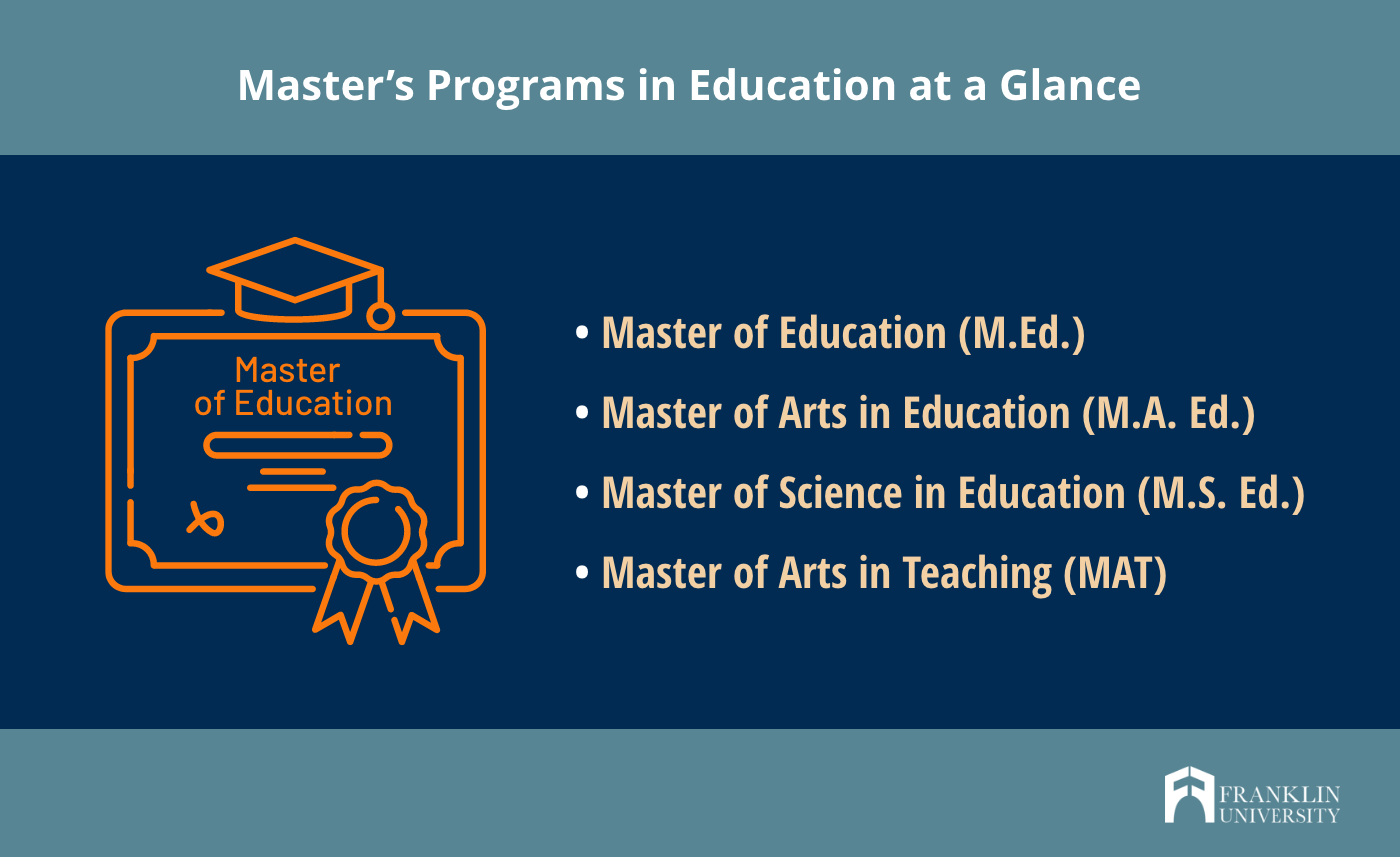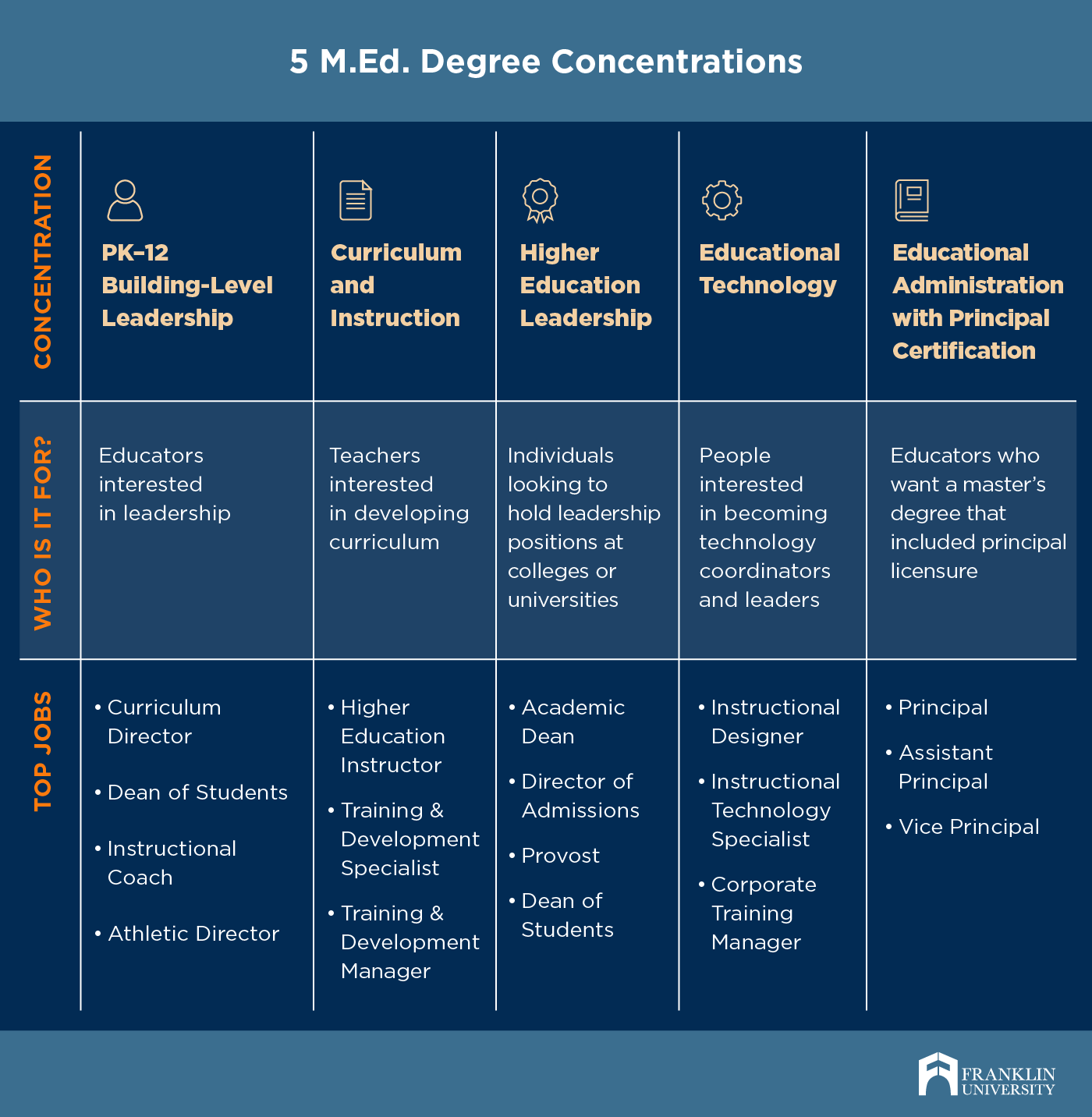Request Information
We're Sorry
There was an unexpected error with the form (your web browser was unable to retrieve some required data from our servers). This kind of error may occur if you have temporarily lost your internet connection. If you're able to verify that your internet connection is stable and the error persists, the Franklin University Help Desk is available to assist you at helpdesk@franklin.edu, 614.947.6682 (local), or 1.866.435.7006 (toll free).
Just a moment while we process your submission.

Which Master’s in Education Should I Get?
For many educators, earning a master’s degree in education is a valuable step in advancing their careers. Whether they want to become a more skilled classroom teacher, a curriculum developer, principal, lead teacher or dean of students, they can find a master’s concentration or specialization that fits their professional goals. Some programs even lead to licensure, as in the case of the principal licensure certification program offered by certain universities.
Master’s Programs in Education: What Are My Options?
There are four main types of master’s degrees in education: Master of Education (M.Ed.), Master of Arts in Education (M.A. Ed.), Master of Science in Education (M.S. Ed) and the Master of Arts in Teaching (MAT).
The degrees have many similarities, but it’s helpful to understand that the type of degree offered is determined by school designation, which means that a Master of Arts in Education at one school could be called a Master of Science in Education at another. The type of degree you pursue will ultimately come down to your career goals.

The rest of this article will focus on the Master of Education (M.Ed.) degree specifically, but you can learn about other types of degrees in The Types of Master’s in Education Degrees: Which Will Be Most Valuable for You?
Get a FREE education career action plan filled with resources and recommendations from those who are already there.
Who Is the Master of Education (M.Ed.) Degree For? What Are the Top Jobs?
A Master of Education (M.Ed.) provides the specialized knowledge you need to achieve your career goals in a format that meets your life. The M.Ed. is a good fit for current teachers or administrators who want to deepen their proficiency in their current role or transition to leadership roles.
“The flexible nature of the M.Ed. makes it the favored choice,” said Dr. Brett Tozer, chair of the School of Education at Franklin University. “Many teachers can’t stop working and go into a full-time graduate situation. The M.Ed. is designed in a way that enables them to continue teaching while they earn their degrees.”
As you consider M.Ed. programs, you want to be sure the college or university you ultimately choose offers the concentration you need to achieve your career goals. Five common concentrations and some of the jobs they lead to include:

M.Ed. in Educational Leadership or Administration (PK–12 Building-Level Leadership)
Who It’s For
Ideal for educators interested in taking a leadership role in their school, or taking on other administrative roles.
What You’ll Learn
With this concentration, you’ll strengthen your knowledge in topics such as management, leadership theory, instructional leadership, school resource management, education law, data-driven decision-making and community relations.
Advantages of This Concentration
With an M.Ed. with a concentration in leadership and administration, you’ll be prepared to take on the responsibilities of any administrator position in an elementary, middle or high school. Its focus on leadership makes it valuable for educators who go into fields outside the school, too.
Top Jobs and Salaries for Degree Earners with a Concentration in Educational Leadership or Administration
The median salary for education administrators, kindergarten through secondary, is $98,420, according to the U.S. Bureau of Labor Statistics (BLS). These administrative jobs, all of which require a master’s degree in education, include:
- Curriculum Director—Develops and oversees the curriculum used by a school or a district, ensuring that it meets educational standards. The average salary for a curriculum director is $74,280, according to Payscale.
- Dean of Students—Oversees student life, student services and on-campus activities. The salary for a dean of students position at a university is estimated to range between $56K and $140K, with an average of $83,477, according to Payscale.
- Instructional Coach—Acts as a mentor and role model for other teachers. Partners with teachers to set and reach goals, providing support, feedback and resources to improve the quality of lessons. An instructional coach makes an annual average salary of $61,136, according to ZipRecruiter.
- Athletic Director—Oversees interscholastic athletics, club sports and physical education programs. Also identifies and contracts coaches, faculty and staff to support athletic activities and oversees the management of facilities, equipment and uniforms. The average salary for an athletic director with an M.Ed. is $78,917, according to Payscale.
M.Ed. in Curriculum and Instruction
Who It’s For
Professionals interested in choosing, developing and implementing curriculum in a classroom, grade level, building or district.
What You’ll Learn
This program covers such topics as educational theory, curriculum design, the application of current educational research, trends in theory, participatory learning, data-driven decision making, instructional leadership and creating assessments. Many students pursuing this concentration can choose a specialization within it, like secondary language arts or elementary curriculum.
Advantages of This Concentration
This concentration is often considered one of the most flexible options in an M.Ed. program because you can choose your focus courses from across other concentrations. Popular combinations include earning a master’s in curriculum and instruction with a focus on a specialization, like TESOL (teaching English to speakers of other languages) or STEM (science, technology, engineering and mathematics), which increase your marketability.
Top Jobs and Salaries for Degree Earners with a Concentration in Curriculum and Instruction
In 2021, the median annual salary for elementary and secondary instructional coordinators—the educators who oversee school curriculums and teaching standards and develop, implement and assess instructional materials—was $75,840, according to the BLS. Similar roles include:
- Curriculum Developer—Helps develop and implement teaching plans to meet educational standards and creates academic training materials. Curriculum developers with an M.Ed. average $70,776 in salary, according to Payscale.
- Higher Ed Instructor—Using classroom experience and knowledge of teaching methodologies, instructs future teachers at colleges, universities and community colleges that don’t require instructors to have doctorates. The average base salary for a postsecondary associate professor is $80,637, according to Payscale.
- Training & Development Specialist, Training & Development Manager—Holds training sessions, develops and reviews manuals and training documents, and assesses the effectiveness of training programs. training and development managers with M.Ed. degrees average $79,151, according to Payscale.
M.Ed. in Higher Education Leadership
Who It’s For
People who are interested in the administration track at colleges or universities, or who would like to pursue work at a nonprofit or government agency that helps shape higher education policy.
What You’ll Learn
In these programs, you’ll become prepared for positions that require high-level decision-making. Examples of courses include educational research methods, reflective leadership, strategic change and innovation, leading in a complex environment, higher education law, student affairs in higher education and equity and access in higher education.
Advantages of This Concentration
You’ll be equipped with the expertise and skills to address the most complex challenges faced by universities and colleges. About 14,500 openings are projected each year for postsecondary education administrators, according to the BLS. They also say the field is growing at a rate of 8%, which means the industry will be looking for qualified candidates to fill roles in administration, the registrar’s office, student services and academic departments.
Top Jobs and Salaries for Degree Earners with a Concentration in Education Leadership
In 2021, the median annual wage for post secondary administrators at colleges, universities and professional schools was $98,180 and $94,120 at junior colleges, according to the BLS. Postsecondary education administration roles include:
- Academic Dean—Leads the educational program of their school within the university and oversees and collaborates with faculty, staff and students. Payscale reports that the average annual salary for academic deans is $69,576.
- Director of Admissions—Manages the school’s admission process, including recruiting, evaluating and processing new students. The average salary for admission directors at colleges and universities is $73,266, according to Payscale.
- Chief Academic Officer or Provost—Oversees all the academic programs at a university or college and leads policy development in student learning, academic programs, teaching and research. Chief academic officers average $140,949 in annual salary, according to Payscale.
M.Ed. in Educational Technology
Who It’s For
People interested in becoming technology coordinators and leaders for buildings, schools or districts. Because technology is constantly changing, people pursuing this master’s degree concentration must be committed to ongoing education and professional development.
What You’ll Learn
Educational technology programs will provide you with a deep understanding of technologies and how to use them to provide an enriching educational experience for students. In addition to covering the latest technology developments in the classroom, these degree programs prepare you for creating STEM programs, leading group training sessions for teachers and administrators and understanding how to choose technology.
Advantages of This Concentration
Technology has transformed education, which has led to growth in job opportunities for people specializing in educational technology. With this degree, you will become an “EdTech” expert capable of integrating traditional pedagogical practices with current technology trends and crafting digital learning experiences in all kinds of educational settings and for all types of students.
Top Jobs and Salaries for Degree Earners with a Concentration in Educational Technology
- Instructional Designer—Utilizes instructional technology to develop lessons and instructional modules for classroom use and works with teachers to implement new technologies in their classrooms. BLS classifies these as instructional coordinators and reports that their salaries in elementary and secondary schools averaged $75,840 a year in 2021.
- District Technology Coordinator, Instructional Technology Supervisor, Instructional Technology Specialist—Helps integrate computers, hardware, software and other technologies into educational settings. Often oversees the school’s online educational programs. The base salary for instructional technology specialists is $40K–$76K, with an average salary of $53,341, according to Payscale.
- Corporate Training Manager—Implements training activities to improve the knowledge and skills of employees. Payscale reports that training managers average $70,311 a year, but with an M.Ed., the average increases to $79,766.
M.Ed. in Educational Administration with Principal Certification
Who It’s For
Educators who are seeking a principal’s certification, or licensure, and a Master of Education degree so they can run an elementary, middle or high school.
What You’ll Learn
In these programs, you’ll gain the knowledge and skills necessary for leading a school, students and teachers. You will learn about instructional leadership and strategies for inclusive classrooms, school law and ethics, managing community relations, supervision and evaluation and more.
Advantages of This Concentration
Because the curriculum aligns with state standards for school leader licensure, this program leads to a Master of Education degree and qualifies you to sit for the principal licensure exam.
Top Jobs and Salaries for Degree Earners with a Concentration in Administrative Program for Principals
- Principal (requires special license program)—Oversees all school operations, including daily school activities. The average salary for principals with M.Ed. degrees at elementary schools is $85,454, $91,459 at middle schools and $91,322 at high schools, according to Payscale. The U.S. Bureau of Labor Statistics (BLS) anticipates that employment of elementary, middle and high school principals will grow 8% from 2020–2030, which is about as fast as the average for all occupations.
- Assistant Principal—Works with other administrators to run an elementary, middle, or PK–8 school. The average salary for an assistant principal with an M.Ed. is $77,557, according to Payscale .
- Vice Principal—Assists with defining and enforcing policies for students, staff and faculty at a high school. Payscale found that the average salary for a vice principal at a high school is $89,239.
Earning a Master of Education degree helps establish your authority in your field and leads to better pay—read M.Ed. Salary: Calculating Value for Education Jobs to learn more about salaries—and better leadership opportunities.
Franklin University offers a Master of Education in Educational Leadership that will give you the tools you need to advance your career and improve the educational outcome of your students. The flexible degree program is ideal for working educators, enabling them to achieve their degrees while continuing to work during the day. It offers a focus area in higher education and another in K–12 building-level leadership. Learn more about the Master of Education in Educational Leadership program.





